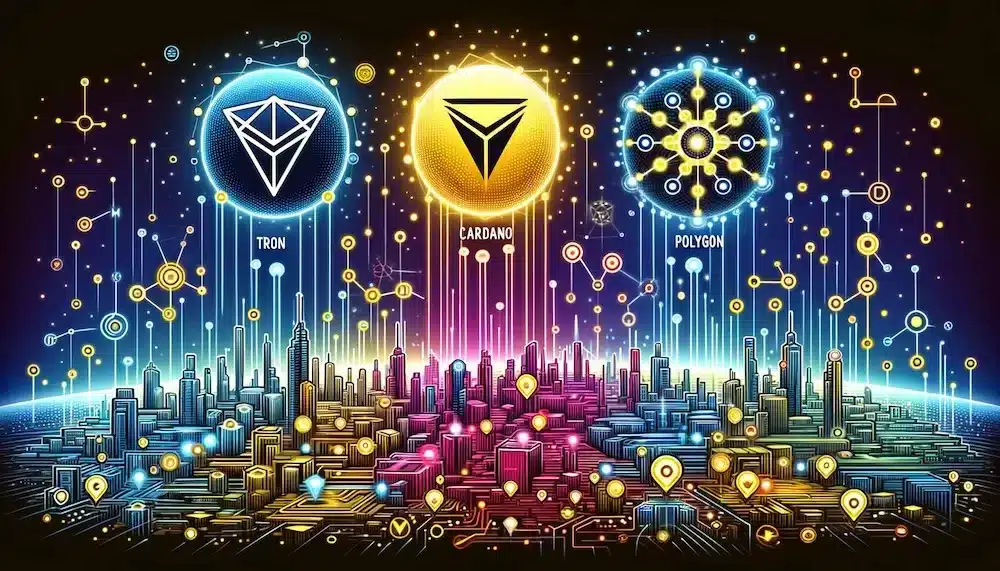
TRON, Cardano, and Polygon emerge as distinct threads, each weaving their own unique pattern in the digital fabric. As we venture deeper into the intricacies of these platforms, their differences become apparent, offering a varied landscape for investors and developers alike. This exploration aims to demystify these projects, highlighting their unique attributes, challenges they’ve faced, and the potential that lies ahead.
Founded by Justin Sun, TRON positions itself as a decentralized platform aiming to revolutionize the entertainment industry. Its mission is to create a free, global digital content entertainment system with distributed storage technology, allowing easy and cost-effective sharing of digital content. TRON’s notable feature is its high throughput, which can handle up to 2,000 transactions per second, outpacing Ethereum at its inception. Despite its ambitious goals, TRON has seen a significant decrease in traction since the last bull run, with criticisms centered around its perceived centralization and questions regarding the originality of its codebase.
Cardano sets itself apart with a strong emphasis on a research-driven approach and peer-reviewed blockchain development. Founded by Charles Hoskinson, one of Ethereum’s co-founders, Cardano aspires to balance the needs of users with those of regulators, and in doing so, combine privacy with regulation. Its layered architecture, separating the settlement layer from the computational layer, allows for more flexibility and robust smart contract functionalities. Despite its innovative technology and strong community support, Cardano too has experienced a decline in momentum since its peak, with critics pointing to its slow development pace.
Polygon (formerly Matic Network) has emerged as a multi-chain scaling solution for Ethereum, aiming to alleviate its congestion issues by providing faster and cheaper transactions. Its framework supports building interconnected blockchain networks, earning the nickname “Ethereum’s Internet of Blockchains.” Unlike TRON and Cardano, Polygon has maintained a relatively steady presence, continually attracting projects and developers to its platform. However, the ambitious prediction of a $10 per MATIC token remains speculative amidst the volatile crypto market and Ethereum’s ongoing upgrades.
At their core, TRON, Cardano, and Polygon each strive to improve upon the limitations of previous blockchain technologies, albeit through different methodologies. TRON focuses on media and entertainment, Cardano prioritizes a scientific approach to blockchain architecture, and Polygon seeks to enhance Ethereum’s scalability. Where TRON and Cardano have somewhat waned in the aftermath of the crypto bull run, Polygon has carved out a niche for itself, capitalizing on Ethereum’s scalability issues.
The decline in traction for both TRON and Cardano can be attributed to various factors, including market dynamics, competition, and community expectations. However, it’s essential to recognize that the blockchain landscape is inherently fluid and subject to rapid shifts in momentum. Polygon’s continued relevance is a testament to its utility in the current Ethereum ecosystem, though its future, especially concerning token value, remains uncertain amidst Ethereum’s evolving landscape.
Despite their differences and the challenges faced, TRON, Cardano, and Polygon each hold promise for the future. TRON’s commitment to revolutionizing digital entertainment could very well find its niche market, especially as the world increasingly moves online. Cardano, with its rigorous scientific foundation, has the potential to introduce groundbreaking blockchain functionality, provided it can increase its pace of development. Polygon’s role as a crucial scalability solution for Ethereum positions it as a key player in the blockchain ecosystem, with ample room for growth.
In conclusion, TRON, Cardano, and Polygon each contribute uniquely to the blockchain space, offering varied solutions to distinct challenges. While they have each faced hurdles since the last bull run, the potential for innovation and impact remains high. The journey ahead for these platforms is not without its uncertainties, but it is ripe with possibilities, promising exciting developments for investors, developers, and the broader blockchain community.



Get the latest Crypto & Blockchain News in your inbox.